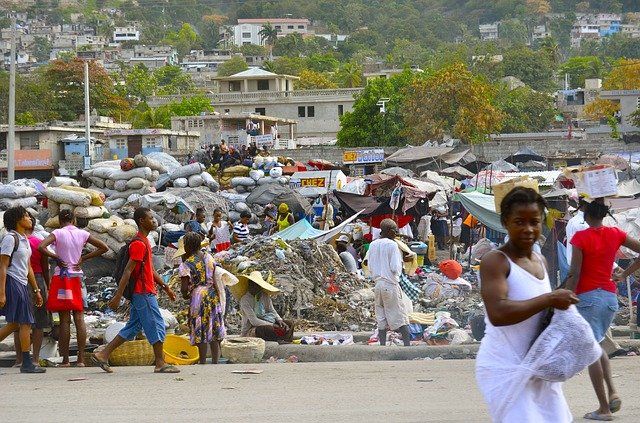Rain on a dry and thirsty land
Christopher Columbus discovered Haiti in 1492. It became a French colony in 1677 and gained independence in 1804. During the twentieth century, it has been beset by upheaval and turmoil. Between 1991 and 1992 the US Coastguard intercepted some 35,000 Haitian refugees as they tried to enter the USA; most were returned to Haiti. The United Nations imposed an oil and arms embargo in 1993 and, in 1994, authorized the occupation of Haiti. With US forces already on their way, the invasion was narrowly averted, and Aristide, the elected president, was restored to office. From March 1995, UN peacekeeping troops took over responsibility for Haiti, and have continued to supervise and train Haiti’s police and army.
Preaching the gospel
Barbed wire and anti-aircraft guns catch your eye as you step off the plane at the capital, Port-au-Prince. A US Marine base is visible outside the main hangar. A band of Haitian musicians play their guitars, trumpets and percussion instruments near the immigration queue. There is a big sign apologiszing for the poor conditions at the airport and requesting patience while reconstruction work is going on. But nothing suggests that reconstruction work is actually happening!

In the evening we found a packed church waiting and singing. I spoke from Romans 1:16-17 on the necessity of preaching the gospel. There was attentiveness and seeming joy in the congregation. Later in the visit we witnessed a Haitian preacher show contrition for having preached a false gospel for so many years. He asked God for grace to know the true gospel and preach it faithfully to his people. These preachers have taught a man-centred message over the years, practising what they have learned from others.
Many questions
The people had many questions. How can a preacher, with a limited knowledge of the gospel, make sure that he is preaching the truth, and not good works for salvation? Are miracles and the gift of healing still possible today? Although Romans 9 speaks of predestination, there are texts such as John 3:16 which seem to point in another direction – how can we explain this? When someone turns to God for salvation, is it necessary for someone else to lead him in the ‘sinner’s prayer’?
Haitian congregations usually sing before the preaching for over an hour, accompanied by a full band of guitars and drums. But they are a very open people. I found it interesting that, when the preacher cited Scripture verses in his message, the people would join in, quoting the verses they knew. At one Baptist church, nearly five hundred people were gathered to hear the gospel. After the services the people did not want to leave. The gospel of grace seemed to them as rain on a dry and thirsty land.









